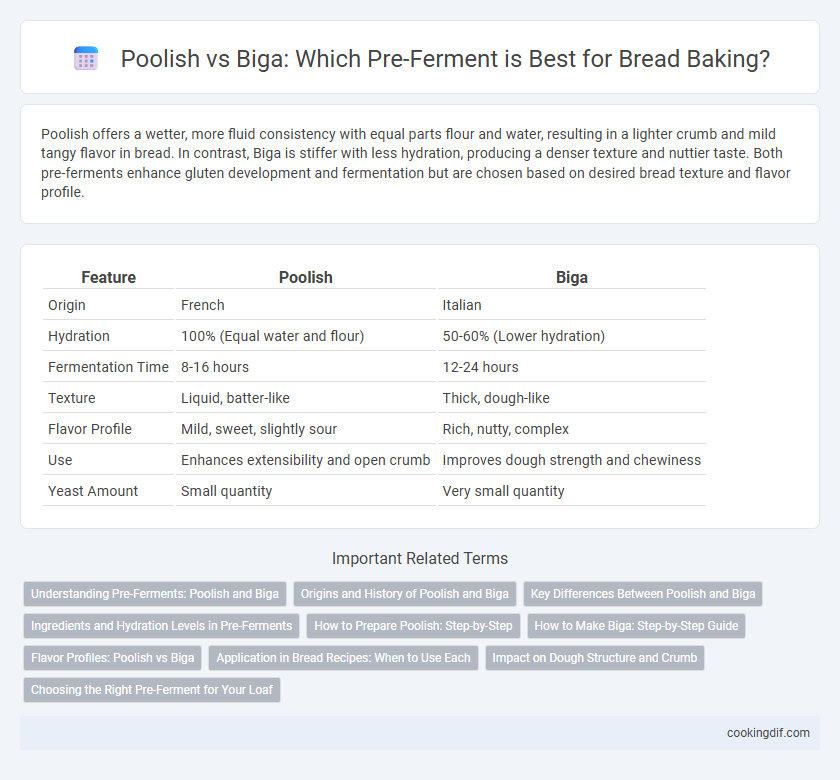Poolish offers a wetter, more fluid consistency with equal parts flour and water, resulting in a lighter crumb and mild tangy flavor in bread. In contrast, Biga is stiffer with less hydration, producing a denser texture and nuttier taste. Both pre-ferments enhance gluten development and fermentation but are chosen based on desired bread texture and flavor profile.
Table of Comparison
| Feature | Poolish | Biga |
|---|---|---|
| Origin | French | Italian |
| Hydration | 100% (Equal water and flour) | 50-60% (Lower hydration) |
| Fermentation Time | 8-16 hours | 12-24 hours |
| Texture | Liquid, batter-like | Thick, dough-like |
| Flavor Profile | Mild, sweet, slightly sour | Rich, nutty, complex |
| Use | Enhances extensibility and open crumb | Improves dough strength and chewiness |
| Yeast Amount | Small quantity | Very small quantity |
Understanding Pre-Ferments: Poolish and Biga
Poolish and biga are traditional Italian pre-ferments used to enhance bread flavor and texture by extending fermentation time. Poolish, a hydrated pre-ferment with equal parts water and flour, creates a loose batter that promotes enzymatic activity and gluten development, ideal for soft crumb and open texture. Biga, less hydrated and firmer, provides a drier, denser dough that contributes to a chewier crust and more complex aroma in rustic breads.
Origins and History of Poolish and Biga
Poolish originated in Poland and was introduced to French bakers in the early 19th century, becoming a staple in French bread making due to its wet, batter-like consistency that enhances fermentation. Biga, an Italian pre-ferment, dates back to the 18th century and is characterized by a stiffer dough, contributing to the distinctive texture and flavor of traditional Italian breads. Both pre-ferments evolved to improve dough extensibility and flavor development, reflecting their cultural heritage and baking techniques.
Key Differences Between Poolish and Biga
Poolish is a wet pre-ferment with equal parts water and flour, creating a batter-like consistency, while biga is a stiff, drier dough with less hydration. Poolish ferments faster, typically within 12-16 hours, enhancing bread's aroma and crumb, whereas biga requires a longer fermentation time, around 16-24 hours, promoting a chewier texture and more complex flavor. The choice between poolish and biga influences the hydration of the final dough and ultimately affects the bread's crust, crumb structure, and flavor profile.
Ingredients and Hydration Levels in Pre-Ferments
Poolish and biga are traditional pre-ferments used in bread baking, differing primarily in hydration and ingredients. Poolish typically has equal parts flour and water, resulting in 100% hydration and a batter-like consistency that promotes a mild flavor and open crumb. Biga, on the other hand, contains lower hydration around 50-60%, creating a stiff dough that enhances dough strength and contributes a nuttier taste to the final loaf.
How to Prepare Poolish: Step-by-Step
To prepare poolish, mix equal parts flour and water by weight along with a small amount of active dry yeast, typically 0.1% to 0.2% of the flour weight, until smooth. Cover the mixture loosely and let it ferment at room temperature, ideally between 70degF and 75degF, for 12 to 16 hours until it becomes bubbly and doubles in size. Use the ready poolish immediately in your dough recipe for enhanced flavor and improved crumb structure.
How to Make Biga: Step-by-Step Guide
To make biga, combine 100 grams of bread flour with 60 milliliters of water and a pinch of active dry yeast, then mix until a shaggy dough forms. Cover the mixture loosely and let it ferment at room temperature for 12 to 16 hours, allowing natural yeast activity to develop complex flavors. Use the biga within 24 hours for optimal texture and aroma in artisan bread recipes.
Flavor Profiles: Poolish vs Biga
Poolish produces a lighter, tangier flavor with a more open crumb due to its higher hydration and shorter fermentation time, enhancing yeast activity and lactic acid bacteria development. Biga develops a nuttier, more complex flavor profile with a denser texture, resulting from its lower hydration and longer fermentation that encourage acetic acid bacteria growth. Both pre-ferments improve dough extensibility and crust aroma but yield distinct sourness and fermentation character in artisanal bread.
Application in Bread Recipes: When to Use Each
Poolish, a wet pre-ferment with equal parts flour and water, enhances the extensibility and open crumb in artisan breads like baguettes, making it ideal for recipes requiring a soft, airy texture and mild tang. Biga, a stiffer pre-ferment with lower hydration, develops stronger gluten structure, contributing to denser crumb and rich flavor, which suits rustic Italian breads such as ciabatta and focaccia. Choosing between Poolish and Biga depends on desired crumb texture, hydration level, and fermentation time specific to the bread style.
Impact on Dough Structure and Crumb
Poolish and biga significantly influence dough structure and crumb texture in bread baking. Poolish, a wet pre-ferment with high hydration, enhances dough extensibility, resulting in an open crumb with irregular holes. Biga, a stiffer pre-ferment, strengthens gluten development, producing a denser crumb and chewier texture.
Choosing the Right Pre-Ferment for Your Loaf
Poolish, a wet pre-ferment with equal parts water and flour, enhances bread's extensibility and produces a mild, slightly tangy flavor ideal for baguettes and softer crumb structures. Biga, an Italian-style stiff pre-ferment with lower hydration, contributes to a denser crumb, chewier texture, and more complex, nutty flavors, perfect for rustic Italian loaves. Selecting the right pre-ferment depends on desired texture and flavor profiles; poolish yields open crumb and aromatic notes, while biga offers strength and a robust taste.
Poolish vs Biga for pre-ferments Infographic

 cookingdif.com
cookingdif.com